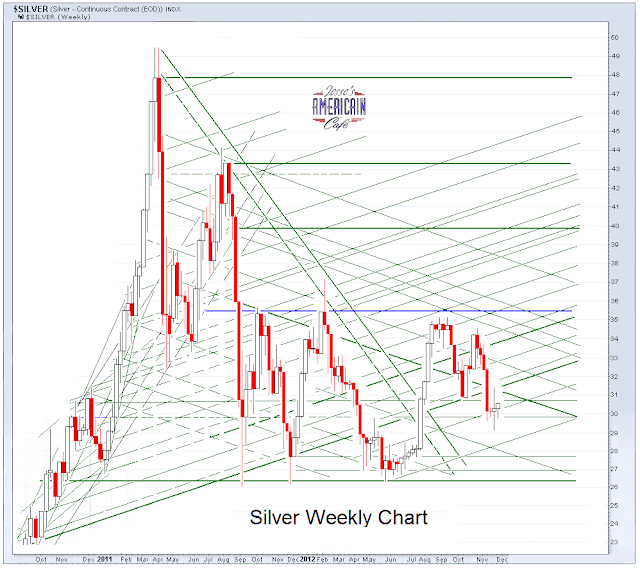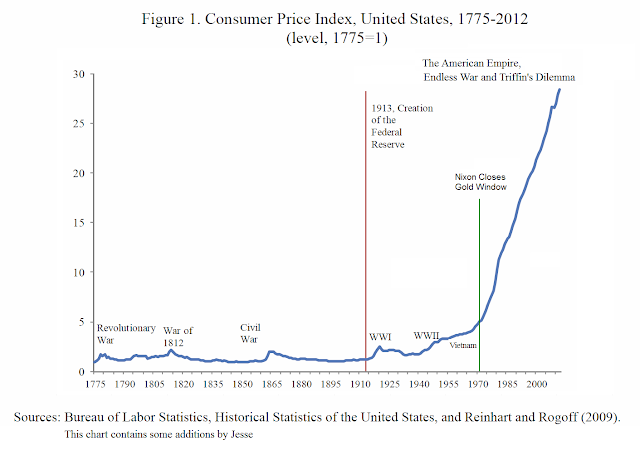"Well, the trillion-dollar-coin thing — deal with the debt ceiling by exploiting a legal loophole to have the Treasury mint one or more large-denomination coins, deposit them at the Fed, and use the cash in the new account to pay bills — has really taken off. Last month I spoke with a senior Fed official who had never heard of the idea; these days it’s all over. [It has been around for quite some time in monetary theory circles, where P.K. apparently does not dally - Jesse]
There seem to be two kinds of objections.
One is that it would be undignified. Here’s how to think about that: we have a situation in which a terrorist may be about to walk into a crowded room and threaten to blow up a bomb he’s holding. It turns out, however, that the Secret Service has figured out a way to disarm this maniac — a way that for some reason will require that the Secretary of the Treasury briefly wear a clown suit. (My fictional plotting skills have let me down, but there has to be some way to work this in). And the response of the nervous Nellies is, “My god, we can’t dress the secretary up as a clown!” Even when it will make him a hero who saves the day?
[Is that like 'The Committee to Save the World?' I would not call it disarming the maniac so much as shooting the hostage to nullify the maniac's leverage. And the clown suits have already seen quite a bit of wear by economic policy whizkids in the past twenty years. Have you ever heard the one about how a US housing bubble is impossible? Or that markets do not need regulation because they are naturally efficient? Or that economics is, as Jamie K. Galbraith said, a 'disgraced profession?' - Jesse]
The other objection is the apparently primordial fear that mocking the monetary gods will bring terrible retribution. [There are no methods of argument so childish and often viciously petty than those that roam the halls of university departments, or talk radio. - Jesse]
Joe Weisenthal says that the coin debate is the most important fiscal policy debate of our lifetimes; I agree, with two slight quibbles — it’s arguably more of a monetary than a fiscal debate, [I can't believe you went there to grab a cheap point but one must do what one must when they don't have anything else. - Jesse] and it’s really part of the broader debate that has been going on ever since we entered the liquidity trap. [It has been going on for time immemorial, for those that have looked at the history of money more deeply than the pages of the NY Times. - Jesse]
What the hysterics [DeLong derided them as 'puritans' when they brought up the moral hazard of TARP, and they were right - Jesse] see is a terrible, outrageous attempt to pay the government’s bills out of thin air. This is utterly wrong, and in fact is wrong on two levels.
The first level is that in practice minting the coin would be nothing but an accounting fiction, [a fiction has more weight than thin air? - Jesse] enabling the government to continue doing exactly what it would have done if the debt limit were raised."
Paul Krugman, Rage Against the Coin, 8 January 2013
No this is not correct Mr Krugman. IF the debt limit is raised, the Treasury can continue to issue more debt subject to the same constraints of the marketplace. But once they take the step of erasing the existing debt through the ridiculous gimmick of over monetization, the process can never be the same again.
The current monetary expansion and system at least maintains a pretense of virtue, and the virtue of Caesar's wife must be above suspicion.
As an experiment I talked with a few intelligent people, mostly engineering types, who don't really have the time to follow the details of economics. I asked them about 'the platinum coin' and they mostly said, 'Oh I heard about it but don't really understand it.'
When I explained what it actually was, they all thought it was barking mad, and found it hard to believe. You see, the vast majority of people still hold to their illusions about how things are in the world.
Personally I think the whole debt limit concept and debate is ridiculous, because the spending has already passed through the appropriations process in Congress where it belongs. If they wish to change something they should do it there.
I would like to see Obama take a principled stand, as that wily politician Clinton did, and call them on their threats as he ought to have done on the fiscal cliff, but deferred out of concern for the unemployed, the middle class, and at least eight important corporate subsidies.
The 'platinum coin' permits direct monetization of debt in a non-market transaction between the Treasury and the Fed, which is something that the supposedly independent Fed does not allow. This is the mechanism which, in Greenspan's words, emulates the rigor of the and external standard like gold in imbuing confidence to the process.
The MMTers address this risk in confidence with arguments similar to a reaction I saw recently to a comparison of such gimmicky monetization to Weimar. 'Their currency failed because the debt they had to pay was denominated in foreign currency.'
And this is correct. In an increasingly brazen monetization, political control over the users of the currency and holders of the debt becomes increasingly important. And Germany did not have the power to exert control over those countries, England and France in particular, which held their debt. That attempt at expanding their control was to come later.
When faith falters in a false proposition based on the need for ever increasing expansion, first fraud and then force must ensue, or it fails. Just ask Bernie Madoff or Jon Law.
Now I think I understand that Mr. Krugman is doing the time honored thing that many publicly important economists tend to do, which is carrying the analytical water for his political team, which is all good and well. I am not opposed to many of the things he recommends, if only he could bring himself to realize that reforming the system as Roosevelt did while providing stimulus is a sine qua non.
But what Mr. Krugman forgets is that when the other side makes themselves look silly and irresponsible, there is some merit in acting like an adult and taking the higher ground, refusing to stoop to the same level. When you deal with thugs, they can drag you down to their level, and then beat you with experience. It is no accident that the Congressional approval rating, driven largely by the House Republicans, is at all time lows.
People may be slow to react, but they are not entirely stupid. "You can fool some of the people all of the time, and all of the people some of the time, but you cannot fool all of the people all of the time."
And I think, or perhaps even fear, that Mr. Krugman does believe what he is saying. At first I was skeptical, but then I read back a little and found this initial flaw in his assumptions.
"...the Federal Reserve is not obliged to tie the dollar to anything. It can print as much or as little money as it deems appropriate."This is correct, but one must add, subject to the valuation assigned to that money by those portions of the marketplace that the monetary authority cannot otherwise intimidate, manipulate, or control, if confidence unravels.
I am not a hard money advocate. But if Mr. Krugman wants to keep making the case for hard money, and provoke a reaction that we all may eventually regret, he should keep making the case that our current system of money is little more than 'an accounting fiction.' People are already suffering financial repression because of the Fed's misguided policies of stimulus without sufficient repair and renewal.
And the argument of 'where is the inflation' is not all that dissimilar to the arguments we heard while the credit bubble was pumped up, the financial sector expanded beyond all reasonable measure, and fraud inflated bonuses from 2003 to 2007, 'where is the financial crisis?'
I know this may sound harsh, but when one is in a very public position of power, and standing for what remains of the liberal conscience and the tattered liberal class, it does provide a very loud amplifier, and brings some additional responsibilities.
I have little doubt that what I say will be ignored, because you still consider this some sort of policy debate, and why would call attention to the salient counter-argument? And that is what is important, right? Winning. We seems to have been winning a lot as a country lately, and losing everything that really matters in the process.
I will give credit to Obama that he rarely descends to such silliness. Although he does seem to lack the higher leadership skills and unshakable principles for which he clearly stands, in the manner of an FDR, a JFK, Jackson, or a Lincoln. He is a Chamberlain, a cynical dealmaker, and not a Churchill.
And that is a pity, because that is what the times require.
Without substantial reform, there will be no sustainable recovery.









































